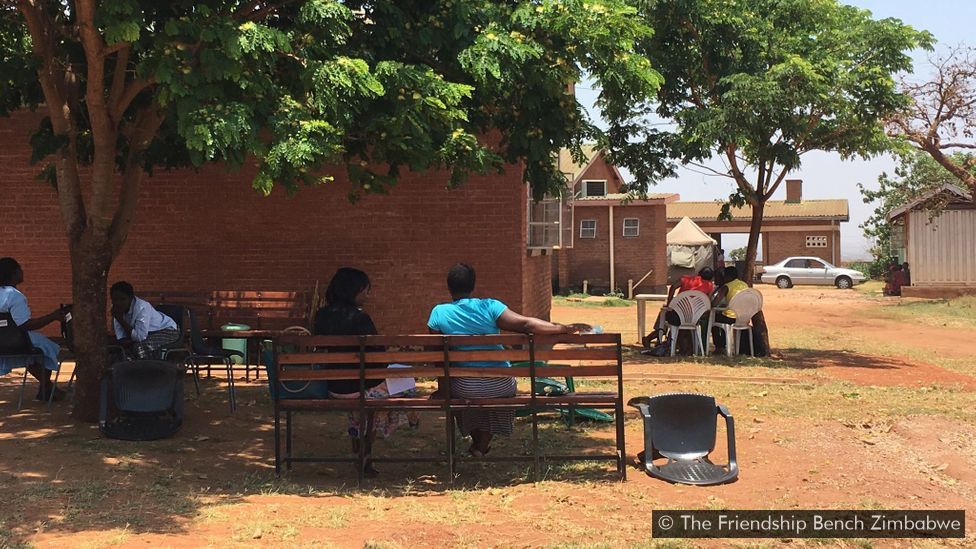Zimbabwe, a country of over 14 million people has suffered years of economic turmoil, mass unemployment and a growing stigma against HIV; all contributing to a widespread mental health crisis across the country.
Here, access to mental healthcare is almost impossible because as few as 20 psychiatrists exist.
In 2006, the Zimbabwe launched an operation called, ‘Remove The Filth’ which displaced hundreds of thousands leaving them homeless and left over half a million people psychologically and emotionally affected.
Since then, doctors in the country have estimated that one in four Zimbabweans battles with depression or anxiety.
With the crisis at an all time high, Dr Dixon Chibanda, a psychiatrist, pioneered an experimental idea to help people who suffered from mental health in communities.
Dr Chibanda believed that after a few weeks of training in the basics of cognitive behavioural therapy, grandmothers could become lay health workers to provide mental health support for their communities.
They would meet at a bench outside healthcare facilities to talk through their problems.
“It was largely an iterative process. I’d be lying if I woke up and said ‘hey why not a bench?’ It actually involved quite a number of people. Particularly, the grandmothers themselves.”
The idea had its push backs and equally its setbacks as well.
“Initially there was a lot of skepticism, a lot of resistance. Particularly from colleagues who thought this was not evidenced-based and it wasn’t going to work. The whole idea of training grandmothers has never been done anywhere else in the world so naturally there was resistance. I was myself apprehensive to be honest.

My idea was to actually train the nurses in the primary healthcare facilities but because the nursing staff were not available, the city health authorities then informed me that I have to try and come up with something working these grandmothers and that also I couldn’t use any of the buildings.
I remember my first grandmother, Grandmother Jaq. She was the most difficult grandmother because she was very pessimistic and she just didn’t think this was something that would work but once she bought into it, she became a real ally. She was instrumental in providing direction and wisdom in the Friendship Bench as it evolved.”
To participate as a mental health supporter at the Friendship Bench organisation, grandmothers are required to know how to read and know how to use a mobile phone.
They will go on board the project and then be equipped. Clients are usually referred by friends, families or clinicians and they are asked a series of questions by the grandmothers to assess their mental health.
Epi Monetsi, the project coordinator of Friendship Bench says questions such as ‘do you get annoyed easily, are you triggered by something trivial or do you think a lot about something?’ are asked and if the client says yes to nine, “we think the client is going through a mental health crisis.”
The grandmother can then begin the talkative therapy method that is cognitive behavioural therapy by simply asking the client to tell his or her story.
Dr Chibanda says though an unusual approach to therapy, he and his team have learnt that storytelling is powerful and when people are allowed to tell their stories in a structured way, it empowers clients and amazing results follow.
Most of the problems that the grandmothers and the team have come across are domestic. For example, domestic violence, the stigma associated with HIV, employment issues, issues relating to children or family, illnesses.
“We treat people having problems with their husbands. Their husbands may have left or sometimes they have no money and they don’t know how to support themselves,” one of the grandmothers, Lucia Ngabo adds.
The grandmothers in turn also share their stories. “Sharing their stories aids in creating a strong therapeutic alliance because listening to someone who has probably gone through the same thing you’re going through yourself is really powerful,” Dr Chibanda says.

Chikombero is a 45-year-old mother who was finding life difficult after her husband left for South Africa and so she went to see a grandmother from the Friendship Bench team.
“I was really down because my husband had taken another wife and he didn’t send any money and I was HIV positive. I really didn’t want to go at first because I was worried they would tell everyone but I went and the grannies are now my friends.
I felt better just after three sessions. They pointed me in the right direction.”
The grandmother’s help the clients to understand what the problems are and to see that there might be a solution. They then explore what they can actually achieve and once there is a plan in place, they follow up with lots of encouragement.
The grandmothers of the team also learn new things as well.
“Before we did the training we didn’t know how to help people with problems like these. We used to think of people with mental health problems as crazy. Now we know it’s not like that,” another grandmother shared.
Not only in Zimbabwe, but across Africa, people are quick to think that mental health issues are spiritual. It’s never seen as psychological by societies. It is often linked to witchcraft.
Thus, it is very difficult for people to embrace others with mental health issues to support them with the care they need. This has affected some people’s responses in receiving support from the Friendship Bench, says the project coordinator.
But the method works.
“The bench works because it’s simple, it’s cheap and it’s run by communities, by grandmothers who are in essence a resource in African communities. They are the custodians of local culture and wisdom. Having the grandmothers does away with western concepts which remove the stigma that is normally associated with mental illnesses.”
According to Dr Chibanda, language has fuelled stigma in the country and on the continent.
“A lot of the western concepts that are used in mental health or in psychiatry actually fuel stigma when you bring them to Africa because people cannot identify with those terms.
This is one of the things we deliberately have done with the Friendship Bench – to actually move away from using western concepts and terms.
We define conditions based on what our community grandmothers see and we define the actual intervention again based on what their grandmothers and local communities resonate with.”
Concerned about the mental health of the grandmothers at a point, Dr Chibanda and one of his colleagues, he calls Ruth, conducted a qualitative study to find out how their community grandmothers were doing because they were dealing with so many people’s problems.
The results were astonishing.
The study found out that prevalence of bad mental health in their participants was much lower than those who were not running the programme.
It turns out the grandmothers really enjoy what they do for the people in their community and get a sense of purpose from their roles as community counsellors.
“We are now respected as we go about our rounds and we get an allowance. I can handle two clients a day. It is tiring but we pace ourselves. I am still fit and I feel it is a calling like a gift from God to work for my community.
We now have a lot of friends in the community. Some actually invite us to see how their lives have turned around. If I have felt there is someone I haven’t been able to help, I refer them to a senior counsellor to help,” Lucia says.
With funding from organisations across the world, Friendship Bench’s practices have flourished in the country. Currently they have reached out to over 50,000 people with 500 grandmothers counselling across Zimbabwe.
The project has done superbly well to the extent that other countries in Africa and in the world have started the project as well.
The team in the organisation’s home country, hopes to train 1,000 grandmothers in total by the end of 2020 and within the next three years aim to train 3,000, reaching a million people in the same time.














